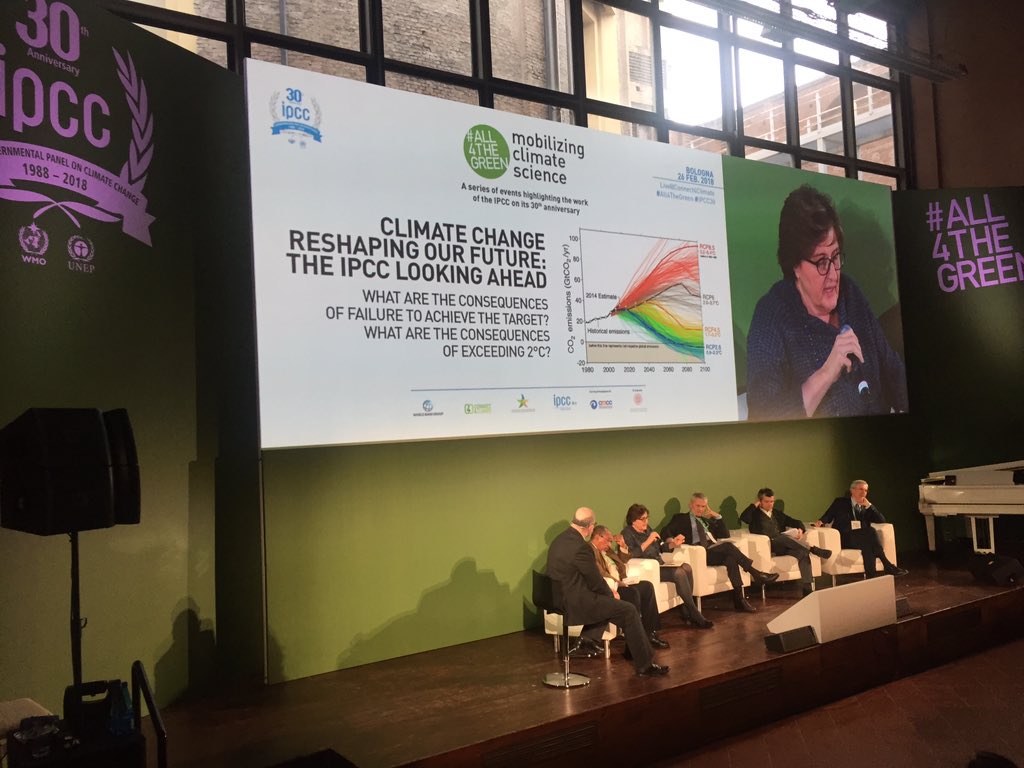
Getting rid of coal, learning to manage climate change risks in the best possible way, building a dialogue between science, business, decision-making, and society. The discussion panel organized by the CMCC Foundation in the context of “All4TheGreen – Mobilizing Climate Science” in Bologna to celebrate the 30th anniversary of the IPCC. With the participation of Youba Sokona, IPCC Vice-President, Carlo Carraro, President of the European Association of Environmental and Resource Economists (EAERE), Nadia Pinardi, President of JCOMM, Sandro Fuzzi, CNR-ISAC, Andrea Segré, Chairman of the Edmund Mach Foundation, and the President of the CMCC Foundation, Antonio Navarra.
There is a bridge between us and the future in which societies are successfully coping with climate change. It is a bridge made of multidisciplinary collaborations, in which different disciplines collaborate to integrate scientific knowledge with the creation of technological and strategic solutions. This bridge to the future was at the center of the debate entitled “Climate Change reshaping our future: the IPCC looking ahead,” which took place in Bologna on 26 February on the occasion of the All4TheGreen – Mobilizing Climate Science Day. The initiative that celebrated 30 years since the founding of the IPCC, the United Nations Intergovernmental Panel on Climate Change.
“Scientific institutions are often organized by separate departments,” Antonio Navarra, President of the CMCC Foundation that organized the debate during the day, said. “It is a way of organizing the research that belongs to the past centuries. Looking to the future means breaking down these barriers and finding a way of contributing together to identify solutions to complex problems that are of fundamental importance for the Planet in the coming decades, such as climate change”.
Interdisciplinarity is crucial to the future, and climate sciences are opening up. “In the Eighties, when we started working with the IPCC – ISAC-CNR scientist Sandro Fuzzi said – it was unthinkable that physicists could interact with chemists or economists. We have worked hard in this direction, and a further turning point has come with the involvement of social sciences in the study of climate change. The latter has become increasingly important, in particular by moving in two directions. “First of all, social sciences help to know people’s behavior – IPCC vice-Chair Prof. Youba Sokona explained. “Looking to the future means finding new ways of producing and consuming energy. To ensure the application of technological solutions in everyday life is useful to understand how people face innovation and how it can enter our habits”.
Advanced tools are needed to create a multi-disciplinary approach to climate change research, and to let information and data accessible to all to go across the bridge. “Data sharing platforms are paramount – Prof. Nadia Pinardi, co-Chair of JCOMM, Technical Commission for Oceanography and Marine Meteorology, said. “We have a large research community, and we must make sure that the data are shared as much as possible to create a space for dialogue between the scientific community, businesses, and decision-makers. By working in this direction – concluded Prof. Pinardi – we will be able to develop increasingly precise models to study the impacts of climate change and to build maps and tools to manage the related risks”.
The technological scenarios and the role of policy in defining the future we are building are at the core of the words of Prof. Carlo Carraro, President of the European Association of Environmental and Resource Economists (EAERE). “The transition to the future we are talking about – explained Carraro – is a transition from fossil fuels to renewables, a path that has so many protagonists. One of them is electrification, namely the tendency to use electricity as energy for many uses, a direction that helps us to get rid of coal once and for all. Another protagonist of the transition is digitalization, which brings with it the need to look at the world in a different way, with new opportunities, new jobs. We must be positive because many technologies help in this direction. Governments have to make choices consistent with this perspective. Otherwise, we will have missed a great opportunity, because we will not have understood that supporting this transition is worthwhile in many respects”.
On the subject of food, Andrea Segré (President of the Mach Foundation) explained that climate change affects everyone, it has consequences on food security. I, therefore, think it is necessary to approach these issue with a holistic vision, especially with regard to research, which starts from the premise of a’ cube health,’ given by the multiplication of human, animal and environmental health. Each element of the One Health operation is fundamental to the equilibrium of the ecosystem as a whole”.
All4TheGreen – Mobilizing Climate Science, was a day of debates to celebrate thirty years of the IPCC, the main international body established in 1988 to provide the world with a clear and science-based vision of this phenomenon. The event was organized by the Minister for the Environment, Land and Sea, the World Bank’s Connect4Climate Global Partnership Programme and IPCC, in collaboration with the CMCC.


